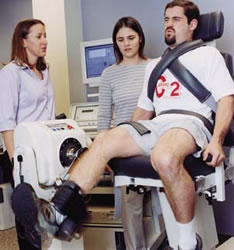| All A's for the College of Education | The fabled march to Fort Hood | Recognition of contributors |
 |
||
| Home Forethought Campus Buzz Feature Stories Re:Search The Score Alum News Yesteryear | ||
What the national fitness chain wanted to know was simple to state but difficult to prove.
Did an experimental program involving circuit training with free weights—a twist to the popular 1980s circuit training method involving weight machines—offer significant improvement in cardiovascular conditioning?
 |
| Graduate students Sarah Marek, left, and Laurie Massey examine Phillip Ross in the muscle physiology laboratory, one of 10 recently opened labs equipped with the latest technology. |
The fitness corporation hoped it did, since heart rates remained within target training zones when subjects moved quickly through a series, or circuit, of exercises. Wisely, the company went to the UTA Department of Kinesiology for scientific proof.
Corporation officials got their science, though the findings proved contrary to their hopes.
“We found that those involved in the training were burning five to seven calories a minute, which was less than during aerobic exercise,” said Sue Beckham, an associate professor of kinesiology.
The experimental training subjects did experience some increases in muscular strength but otherwise not much of what exercise experts call a “training effect.”
“Heart rate is a good indicator of exercise intensity when using large muscle groups,” Dr. Beckham said. “The heart rate remains elevated when performing arm exercise. But oxygen consumption, the gold standard for assessment of exercise intensity, does not increase much.”
Such research requires both specialized equipment and a considerable investment of time and money—luxuries typically associated with a small but growing number of fitness facilities and equipment manufacturers.
Now add UTA to the list.
A new master of science in the physiology of exercise—how the body responds to exercise—began last fall.
“The clear emphasis of the program is research,” said Beckham, who was heavily involved in developing the program curriculum.
Though several other Texas schools offer graduate degrees in various components of exercise science, otherwise known as kinesiology, Beckham believes that UTA’s emphasis on research will set this program apart. About 10 graduate students are involved, and the number is expected to grow.
UTA offers a distinct advantage to these students in the form of a $1.2 million, 10,000-square-foot laboratory that opened in the fall and includes the best equipment available for precise measurements of oxygen uptake, body composition and muscular strength and endurance. The two-story laboratory occupies the renovated space of six racquetball courts and is divided into 10 labs where various physiological responses can be measured.
The facility has equipment to precisely measure body density and features a laboratory for athletic training and one for blood chemistry. The labs have led to partnerships with some of the leading research facilities in the Fort Worth-Dallas area.
“It’s a dream come true to have these laboratories,” said kinesiology Chairman Barry McKeown. A long-time advocate for both the new master’s program and the expanded labs, he wrote the graduate proposal that was recently approved by the Texas Higher Education Coordinating Board.
His enthusiasm is clearly contagious.
“I’m very excited because this equipment is state of the art,” said kinesiology Assistant Professor Joel Cramer. “It’s going to make our research much easier.”
As Dr. Cramer speaks, graduate student Julie Culbertson extends her leg while sitting in a machine that looks like a blend of computer and exercise equipment but that actually measures muscular strength and endurance of nearly all joints in the body.
Culbertson is having a good time with the Biodex equipment, its presence one of the main reasons she enrolled at UTA.
“I was really impressed by the labs,” she said. “There are a lot of opportunities for studies. It was a big selling point.”
Even with advanced equipment, however, exercise research is a time-consuming endeavor.
“This type of research is typically labor intensive and requires the assistance of multiple faculty and graduate students,” Beckham said. “This master’s program is a win-win situation for both the University and our students, who’ll end up with extensive research experience.”
Much of Beckham’s research, for instance, involves the effects of nutritional supplements and the benefits of resistance training. Subjects must participate in training studies that require pre- and post-testing after a four- to 12-week period.
“Training studies require monitoring and observation of subjects to ensure that their workouts are at the prescribed frequency, intensity and time,” she said. “It’s impossible for one investigator to follow so many people in a week.”
What’s more, each data collection session may last two to six hours.
“It’s time-consuming, but at the same time it is a great opportunity for students in terms of research,” Beckham said.
Such research also tends to be pragmatic, often building connections in the community. The Department of Kinesiology hopes to expand its research to include investigations of the work demands placed on firefighters and police officers as well as the impact of body composition and fitness on their ability to perform work-related tasks.
Graduate students will also gain valuable clinical experience, developing exercise programs for diabetics, heart attack survivors and other special populations. The contribution to society in terms of helping people with exercise physiology and their general health is significant, Beckham says.
“It’s going to be a great experience for master’s students in that the faculty will work closely with them as they move through the program, giving them a wide variety of exposures to the discipline.”
— O.K. Carter
| Archives
| Alumni Association |
Giving to UTA | UTA
Home Copyright © 2004 UTA Magazine. All rights reserved. |